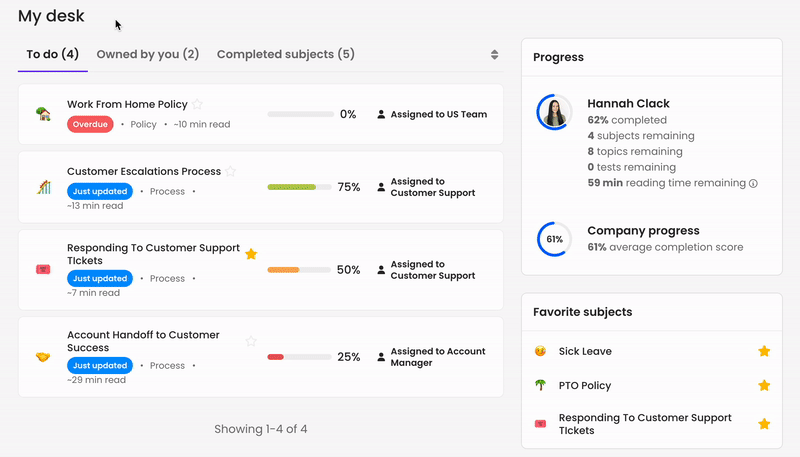Templates for documenting your new Threads processes and policies
July 12, 2023
We’re on the bandwagon. Say hi to us on Threads @trainual.
Hot off the SMB press this week:
- A short and sweet guide to creating company policies.
- Your Trainual account’s brand new look.
- How to keep your policies from becoming red tape.
- Three templates to help you update your social media documentation (thanks, Threads).
HOW TO BUILD A BUSINESS PLAYBOOK
The 3-step process to writing company policies
Love ‘em or hate ‘em, policies are necessary. They keep your team safe, they keep things fair, and they keep your business organized. Without these rules, your growing business could fall into chaos pretty quickly — leaving you to pick up the pieces.
But when it comes to implementing company policies for the first time, it can be challenging to say the least. Your employees are used to getting sh*t done in any way possible. So, policies that are too restrictive could repress their decision-making freedom and creativity — halting all that growth you’ve been making.

That’s why you need to learn how to implement policies the right way — by checking out episode 6 of the “How To Build a Business Playbook” masterclass. We talk about the importance of documenting your company policies, as well as outline the three steps to creating effective ones.
With the right policies in place, you can set expectations for how your people should behave in the workplace and hold them accountable. And more importantly, you can set standards that will define the company culture that will help you scale and grow.
👉 Access the full masterclass now.
HI, DESK
Here’s how to give employees a snapshot of their training to-dos

You can dish out new training, processes, and policies all day long. But if you don’t give your team an easy way to access it all, you might as well have printed it out and snail-mailed it to them. (Because it’s never getting read.)
The good news: Trainual’s new and improved My desk homepage gives your team more visibility than ever into their training creation and completion progress — helping them stay on top of everything they need to do (and know) in Trainual.
The new My desk gives employees ultra-quick access to:
- Complete training to-dos — jumping back in right where they left off!
- Edit the content they own and are in charge of keeping up to date.
- View the assignments they’ve completed and would like to revisit.
Plus, it has a snapshot of personal completion progress — how close they are to 100% completion, how their progress compares to the rest of your team, the number of subjects they still need to tackle, and more!
👉 Check out the new My desk. (New to Trainual? Try for free.)
STARTER PACK
Template(s) of the week: Social Media Management Process (+ more!)

Hey, have you heard of this hip new social media app called Threads? Okay, silly question. Of course you have: Since Meta’s newest social app launched last week, it’s been the talk of the town.
With Twitter’s decay happening in real-time, the need for a new text-based social app has been growing — and the response to Threads proves it. The app broke the record for most downloaded app on launch day with 30M sign-ups and has already passed the 100M sign-up mark. So naturally, businesses are already jumping into the fray.
Many big-name brands, including Nike, Reese’s, and Walmart, have already set up accounts. And while some businesses are still holding back (it has only been a week), there are many signs that Threads could pose a major threat to Twitter’s market share.
Meaning, all businesses — big and small alike — need to figure out the best way to manage this new social media platform. And then document that process to share with the rest of their team.
👉 We’ve got you covered on the documentation. Check out our updated Social Media Management Process template, with an entire section dedicated to Threads. And while you’re at it, explore our Social Media Policy and Social Media Manager role templates. That way, your team can stay aligned on all things social media — no matter what new apps start trending.
Want more templates to help you build your business playbook? Check out our entire template archive of free, multimedia-enhanced, and customizable policy, process, and role starters. New to Trainual? Try for free.
NO RED TAPE
How company policies can help set your employees free

Policies are going to hold my team back.
We get it — policies are put into place with good intentions, but sometimes they become too complex or restrictive, leading to delays or inaction (hence the name “red tape”).
That’s what happens when we take setting policies too seriously. Yes, we want to set boundaries for what’s okay and not okay in the business, but at the end of the day, most policies are simply clarity on anything unclear to your employees.
What does that mean?
According to Meghana Reddy, former VP of people and operations at Loom, "anything that has ambiguity is where policies really help people." You need to ask yourself two questions:
- What are the questions I'm getting every day?
- What do people on my team not feel clear about?
You then set rules and guidelines based on the answers to those questions — and voila! You have a documented policy that clarifies something your employees were confused on. Now, there’s one less thing for them to worry about.
Now imagine you had policies to address all their concerns — they’d have more mental capacity to focus on working in your business. And you’d get to spend less time addressing problems that your policies now solve. A win-win!
That makes sense. What else should I set policies on?
Strava’s Chief People Officer Michele Bousquet said it best: The first policies you need at your company are your core values.
Put plainly, having your values first makes building policies in unexpected situations easier. Because they act as an anchor and keep you tethered to what your company stands for. That way, when you have to pivot your business strategy or adapt to a worldwide change, you can align new policies quickly with your brand.
👉 Read on for more policy-making tips.
TL; DR
This week's highlight reel
- Backing the B.A.R. The NAACP initiative, sponsored by BACARDÍ rum, is awarding a total of $350K in acceleration grants, education, support, and entrepreneurship solutions. Black-owned businesses in the beverage alcohol service, sales, and hospitality industries can apply for a $10K grant by July 30.
- Heavy competition. There’s a reason it doesn’t quite smell like teen spirit this summer: The 16 to 19-year-olds willing to work either 1) already have a job, or 2) are picky AF — AKA, prepared to drop everything for the highest-paying gig with the most flexibility. Might be time to show those youngins how hip and cool you are on Threads to lure them in.
- No touchy. Small businesses will soon be able to sell their merch using VenHub, a fully automated, mobile store. Basically, a gargantuan vending machine. Pros: It’s cheaper, smaller, and prevents theft (as opposed to an actual store). Cons: People like to touch stuff. If we’re taking a gamble on those questionable pants, we’re doing it from the comfort of our couch.
- Wait, that’s still a thing? Apparently, people are still fired up about “Angry Birds” (over a decade later?) because an entire themed restaurant just opened up in New York. We might visit if it was a “Happy Birds” cafe, but let’s just leave the negative energy in the past, shall we? #JusticeForTheCutePigs.




